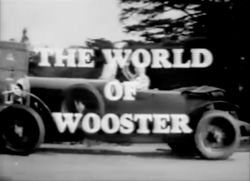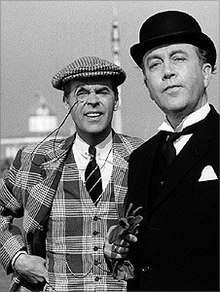The World of Wooster
| The World of Wooster | |
|---|---|
 The title card of The World of Wooster | |
| Genre | Comedy |
| Written by | Richard Waring, adapted from the stories of P. G. Wodehouse |
| Starring |
Ian Carmichael Dennis Price |
| Country of origin | England |
| Original language(s) | English |
| No. of series | 3 |
| No. of episodes | 20 |
| Production | |
| Producer(s) | Michael Mills |
| Distributor | BBC Television |
| Release | |
| Original network | BBC1 |
| Original release | 30 May 1965 – 17 November 1967 |
| Chronology | |
| Related shows | The World of Wodehouse |

The World of Wooster is a comedy television series, based on the Jeeves comedy stories by English humorist P. G. Wodehouse.
The series aired on BBC Television from 1965 until 1967 in three series. Most episodes are lost.[1]
Cast members
Principal cast
- Ian Carmichael – as Bertie Wooster
- Dennis Price – as Jeeves
Recurring cast
- Derek Nimmo – as Bingo Little (5 episodes)
- Eleanor Summerfield – Aunt Dahlia (5 episodes)
- Fabia Drake – as Aunt Agatha (4 episodes)
- Timothy Carlton – Claude (2 episodes)
- Simon Ward – Eustace (2 episodes)
Background and production
The series was produced by Michael Mills. The episodes were adapted from the stories of P. G. Wodehouse by Richard Waring. Twenty episodes, each about 30 minutes long, were made for the series.[2] Minimal, economical sets were used, and Bertie's apartment had a contemporary design, including a central staircase and intricate screen door.[3]
In some ways, the interpretations of Bertie Wooster and Jeeves in the series differ from how the characters are described in Wodehouse's stories. Ian Carmichael portrayed Bertie Wooster with the nervous mannerisms that he had earlier brought to affable, bewildered characters in comedy films such as Lucky Jim, and added a stammer and a monocle, both noncanonical, to the character. He was also significantly older than the canonical Bertie Wooster. Dennis Price portrayed Jeeves as an older, stiff, dignified figure, regarding himself as superior to the proceedings around him, rather than being more involved like the canonical Jeeves. Additionally, changes were made to the dialogue and situations to increase the tension between Jeeves and Aunt Agatha.[3]
The series was successful, but after twenty episodes, Carmichael and others believed that they had adapted all the stories suitable for television. A serial adaptation of the Jeeves novel The Code of the Woosters was considered, though the idea of changing the series from an anthology to serial format was rejected. Instead, another series, The World of Wodehouse, was created to adapt other short stories written by Wodehouse.[4]
Theme song
The theme song, "What Would I Do Without You Jeeves?" was sung (in character) by series lead Ian Carmichael. An extended single version also featuring Dennis Price as Jeeves was released with another in-character song by Carmichael, "Bertie's Lucky Day" on the b-side.[5]
Episodes
Series 1
- "Jeeves and the Dog McIntosh", based on "Episode of the Dog McIntosh", 30 May 1965
- "Jeeves, the Aunt and the Sluggard", based on "The Aunt and the Sluggard", 6 June 1965
- "Jeeves and the Great Sermon Handicap", based on "The Great Sermon Handicap", 13 June 1965
- "Jeeves and the Song of Songs", based on "Jeeves and the Song of Songs", 20 June 1965
- "Jeeves and the Hero's Reward", based on "Scoring off Jeeves", 27 June 1965
- "Jeeves and the Inferiority Complex of Old Sippy", based on "The Inferiority Complex of Old Sippy", 4 July 1965
Series 2
- "Jeeves and the Delayed Exit of Claude and Eustace", based on "Sir Roderick Comes to Lunch" and "The Delayed Exit of Claude and Eustace", 4 January 1966
- "Jeeves and the Change of Mind", based on "Bertie Changes His Mind", 11 January 1966
- "Jeeves and the Spot of Art", based on "The Spot of Art", 18 January 1966
- "Jeeves Exerts the Old Cerebellum", based on "Jeeves in the Springtime", 25 January 1966
- "Jeeves and the Purity of the Turf", based on "The Purity of the Turf", 1 February 1966
- "Jeeves and the Clustering Around Young Bingo", based on "Clustering Round Young Bingo", 8 February 1966
- "Jeeves and the Indian Summer of an Uncle", based on "Indian Summer of an Uncle", 15 February 1966
Series 3
- "Jeeves and the Greasy Bird", based on "Jeeves and the Greasy Bird", 6 October 1967
- "Jeeves and the Stand-in for Sippy", based on "Without the Option", 13 October 1967
- "Jeeves and the Old School Chum", based on "Jeeves and the Old School Chum", 20 October 1967
- "Jeeves and the Impending Doom", based on "Jeeves and the Impending Doom", 27 October 1967
- "Jeeves and the Hard-Boiled Egg", based on "Jeeves and the Hard-boiled Egg", 3 November 1967
- "Jeeves and the Love That Purifies", based on "The Love That Purifies", 10 November 1967
- "Jeeves and the Fixing of Freddie", based on "Fixing it for Freddie", 17 November 1967[6]
Reception
The series was widely popular and critically acclaimed, and was distributed worldwide. It won awards for best script and comedy in 1965 from the Guild of Television Producers and Directors.
Wodehouse initially felt that Carmichael would be fine as Bertie Wooster, but later believed that Carmichael overacted; however, Wodehouse was satisfied enough with Carmichael's performance to later ask him to portray Bertie or Jeeves in a musical comedy. Carmichael declined, feeling he was too old to play Bertie again and that public perception prevented him from playing Jeeves. Wodehouse was more positive about Price's portrayal as Jeeves, stating that Price was "the best Jeeves he had ever seen".[3]
References
- Notes
- ↑ The World of Wooster, lostshows.com.
- ↑ Brooke, Michael. "World of Wooster, The (1965-67)". BFI Screenonline. BFI Screenonline. Retrieved 18 March 2018.
- 1 2 3 Taves (2006), p. 114.
- ↑ Taves (2006), p. 117.
- ↑ http://www.45cat.com/record/r5429
- ↑ Taves (2006), pp. 176–179.
- Sources
- Taves, Brian (2006). P. G. Wodehouse and Hollywood: Screenwriting, Satires and Adaptations. McFarland & Company. ISBN 978-0786422883.